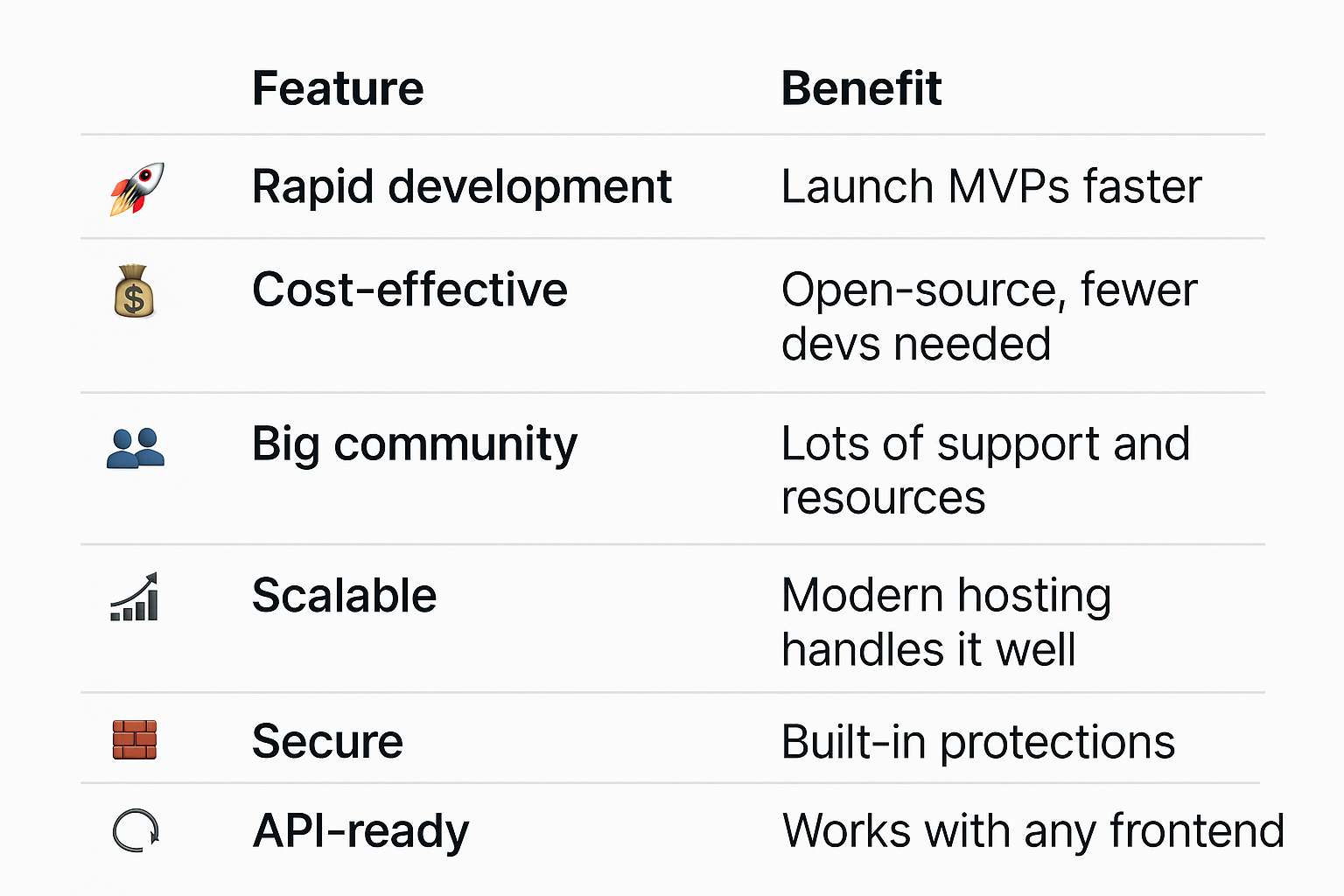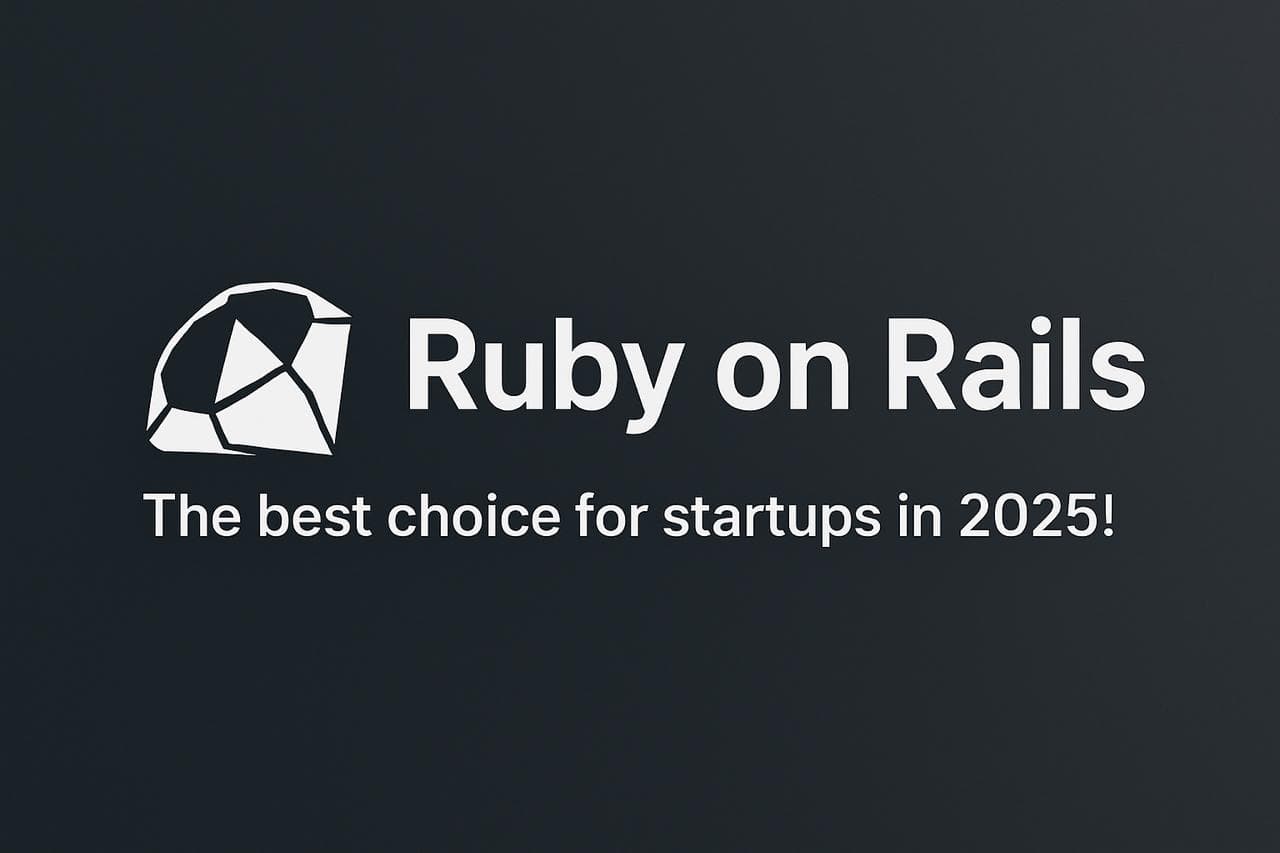Introduction
In the fast-paced world of startups, picking the right technology stack can make or break a business. Startups need tools that are fast, reliable, and affordable. In 2025, even with newer frameworks entering the scene, Ruby on Rails (RoR) continues to be a go-to choice for founders and developers around the globe.
But why is this 20-year-old framework still holding its ground?
Let’s break it down in simple terms.
What is Ruby on Rails?
Ruby on Rails (often just called Rails) is an open-source web development framework built using the Ruby programming language. It helps developers build websites and web apps quickly and efficiently.
Rails follows the philosophy of:
- Convention over Configuration - fewer decisions for developers to make, faster development.
- Don't Repeat Yourself (DRY) - write less code, achieve more.
Why Startups Still Choose Ruby on Rails in 2025
1. Speed of Development
Time is money, especially for startups. Ruby on Rails lets developers build applications quickly.
- Comes with built-in tools for common features (user logins, forms, APIs, etc.).
- Generates boilerplate code so you don’t have to start from scratch.
- Makes prototyping and launching MVPs (Minimum Viable Products) very fast.
2. Cost-Effectiveness
Stretching every dollar is crucial for startups. Being open-source, RoR eliminates the need for expensive license fees. This lets startups keep initial expenses low and invest more in product development rather than infrastructure.
RoR allows startups to handle necessary tasks with small, nimble teams unlike other frameworks, as it has a vast library of pre-built gems. With which, it also contributes to developing and launching the product faster onto the market. This quick turnaround leads to faster iterations and profits for startups.
That said, it is important to hire skilled RoR developers who align with your goals for long-term success.
3. Scalability for Growing Startups
The success of any startup hugely depends on managing surges and demands of the application efficiently. As startups attract customers, the user base and data volume will steadily increase. Without a scalable system in place, startups are more likely to face downtime and bottlenecks, which may lead to poor user experience.
With Ruby on Rails, you don’t need to worry about the technical side of growth. Rails is built to handle more requests and manage complex features so as to ensure the smooth functioning of the application. With every Rails upgrade, RoR team introduces various performance improvements to make developers' work easy.
Whether it is Action Text in Rails 6, Hotwire in Rails 7, or Solid Queue in Rails 8, all these features ensure reduced development time and effort for developers, making it an irresistible choice for startups to grow sustainably and quickly.
The success stories of Shopify, Basecamp, and Instacart stand as proof of the applications. They began with small teams and scaled efficiently with Rails to meet huge demands without losing their edge as they grew into a global brand.
4. Rich Community Support.
One of the greatest advantages of using RoR is its vibrant global community which provides extensive support and collaboration. Whether it is tricky implementation or any brainstorming, the community ensures that coders are provided with all the guidance. It’s the kind of support system that a startup always looks for to hit the ground running.
The Rails community is keen on regularly releasing new gems and tools that simplify and enhance overall development processes. This helps startups implement advanced features without having to invest heavily in custom solutions. Events like RubyConf and RailsConf give startups a great chance to connect, exchange ideas with industry leaders, and find potential collaborators.
We, the Rails factory, firmly believe that these community events spark genuine innovation among techies and are proud to mention that we are the silver sponsors of rubyconfIndia2024.
5. Versatility and Compatibility.
The robust RESTful architecture of Rails makes it a no-brainer for startups. Whether it is the integration of third-party services such as payment gateways, analytics, etc. or the creation of APIs, Rails' built-in tools and a plethora of gems ensure it happens seamlessly.
When it comes to compatibility with cloud platforms, Rails works well with AWS, Google Cloud, and Heroku. Meaning, with Rails, startups can enjoy the versatility and compatibility that Rails architecture offers. This can ensure that your application is always ready for today’s demands and tomorrow’s opportunities while optimizing the costs.
No matter if it is a monolithic or microservices model, you will have all freedom with Rails to design your application as per your needs and growth trajectories.
6. API-Ready and Frontend Flexibility
In 2025, most apps are API-first. Rails easily handles:
- Building RESTful APIs.
- Integrating with modern front-end tools like React, Vue, or Hotwire (Rails’ own frontend).
You can use Rails for the backend while choosing whatever fits your front end.
Examples of Startups Still Using Rails
- Basecamp – Still powered by Rails, built by its creator.
- Shopify – One of the world’s largest eCommerce platforms.
- Hey – Modern email service.
- New 2025 startups in fintech, healthtech, and edtech – choosing Rails for rapid MVPs.
Summary

Conclusion
While AI is fueling innovation and reshaping industries, the positive climate for creating startups with new solutions and business models continues to rise.
Statistics show that there are more than 150 million Startups worldwide, of which 82,038 startups are in the United States.
The numbers indicate a thriving entrepreneurial ecosystem that continues to expand in the upcoming years. However, startups must make wise choices to succeed in competition, address market fit issues and sustain for a long term in the industry.
If you are looking to build web applications swiftly and efficiently, we double down on relying on Ruby on Rails for startups in 2025 and we broke down the reasons in detail in this article.
Offering trusted services for years, our team of ROR experts can analyze your requirements step by step, develop a tailored strategy to meet your needs, and build your application at a reasonable cost.
Good luck to your startup!
Written by Ahmad
Ahmad Hasan, Senior Ruby on Rail Expert with 10+ years of experience, with a strong focus on Backend development. He builds web and mobile applications using React,Next, React Native, and TypeScript, and Contributed to backend development using Python, Java, and Ruby on Rails.
